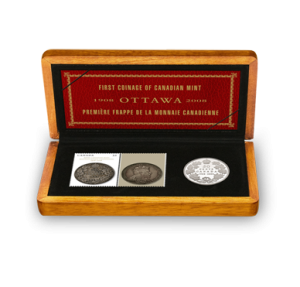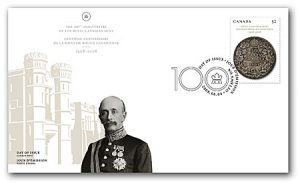On today’s date in 1908, Governor-General Albert Grey activated the press at the newly founded Royal Canadian Mint to strike Canada’s first domestically produced coin, a 50-cent piece.
“As the King’s representative, I formally declare the Ottawa Branch of the Royal Mint open,” said Grey, Canada’s ninth Governor General since Confederation, as he struck the first official coin produced in Ottawa.
Later in the day, surrounded by an audience of dignitaries, Countess Grey – Alice Holford – closed the ceremony by striking the Dominion’s first bronze cent.
ORIGINAL OPENING POSTPONED
Originally, the official opening was scheduled for Nov. 9; however, this was postponed until the new year because of a security concern.
The facility lacked a surrounding fence, which was considered essential for an operation of that size and significance. The fence was eventually completed on time, although its final cost tripled its original estimate, causing some controversy for the government.
Throughout the past 111 years, the Mint has emerged as a global leader in minting. Today, an automated plant in Winnipeg produces circulation coins for Canada as well as the Mint’s international clients, and the Ottawa facility performs refining and assaying as well as the production of bullion and numismatic coins.
MINT CENTENNIAL
In June 2008, Canada Post issued a commemorative domestic-rate stamp (52 cents) to mark the centennial of the Mint.
The stamp (Scott #2274) depicts one of the first coins minted at the Ottawa branch—the 1908 50-cent piece featuring a crown and a border of maple leaves. The coin’s obverse – a portrait of Prince Albert Edward, Queen Victoria’s son – appears on the pane alongside images of other coins from the series.
“I wanted to create a design that captured the essence of what the RCM produces,” said designer Stéphane Huot, in 2008. “A coin is not only a national symbol, but also a part of everyday life. So rather than feature a mint-edition copy, I chose a coin that Canadians had actually held in their hands.”
To create the design, Huot worked with an original coin supplied by the Mint. To further accentuate the coin, the stamp features a high-relief image achieved through embossing.
Printed by Lowe-Martin on Tullis Russell paper using six-colour lithography plus embossing, the stamps measure 34 millimetres by 45 millimetres (vertical). An official first-day cover was also cancelled in Ottawa.



